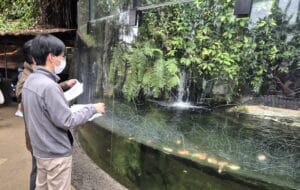Truly caring for the diverse welfare needs of individual wild animals within a zoo or aquarium is a sophisticated and deeply nuanced undertaking. Recognising this inherently complex challenge, the Japanese Association of Zoos and Aquariums (JAZA) continues to demonstrate a proactive commitment to advance animal welfare standards across its membership through their long standing partnership with leading animal welfare charity, Wild Welfare. Recently the organisation has further strengthened this partnership through the delivery of an advanced auditor training programme for JAZA members.
This in-depth three-day programme hosted by Ueno Zoo in Tokyo, equipped 11 experienced auditors working at JAZA zoos and aquariums, with the opportunity to continue their ongoing learning. The event gave participants the chance to gain additional skills and knowledge on leading in-depth and thorough welfare audits within their member institutions.

JAZA auditors conducting a mock inspection at Ueno Zoo.
Auditing is a vital part of providing good animal welfare, as it delivers an objective analysis based on whether established standards are being met. Audits are a non-biased insight into what is working effectively and, crucially, what can be improved. This process encourages in-house problem-solving, and ultimately helps zoos and aquariums to proactively improve the lives of the animals they care for.
Building upon the initial training conducted in 2022, in which Wild Welfare played a key role in helping JAZA meet the World Association of Zoos and Aquariums (WAZA) Animal Welfare Objective (a global benchmark for animal welfare evaluations). This follow-up event focused on building JAZA’s capacity, helping to reinforce previous learning, while building the confidence of participants to confidently lead audits as well as mentor new JAZA auditors.

Wild Welfare Director, Simon Marsh, presenting to the JAZA auditors.
Wild Welfare and Wild Welfare US facilitators Dave Morgan and Margaret Whittaker, delivered the intensive 3-day course that blended theoretical presentations with practical hands-on sessions. The course covered key areas of focus including the fundamental differences between welfare inputs and outputs, the importance of subtle observation and recognising animal behaviors (such as abnormal indicators), as well as the requirements for competence and consistency in auditing procedures. Participants also explored the importance of understanding and following the ISO (International Organization for Standardisation, a nongovernmental organisation that produces and publishes international standards) auditing system, and its role in welfare auditing procedures.
One key element of the training was a role-playing exercise designed to prepare auditors to manage tough real-world situations. Trainees negotiated scenarios such as managing disputes over audit findings. These interactive sessions successfully helped to build confidence and problem-solving skills within the group of auditors. The entire course was interpreted into Japanese, with the assistance of translators that were present at all times to facilitate question answering and free flowing discussions.

Practical activities allow auditors to hone their knowledge and skills.
Following JAZA member’s initial Wild Welfare training, auditors conducted 10 in-house welfare audits at locations across Japan. Following further review, it was determined that a higher level of training should be provided to further enhance the skills of the auditors. Being an organisation of over 130 member institutions, JAZA is committed to growing its auditor capacity and expanding the skill set of their current auditors working towards JAZA’s own Animal Welfare Standard.
“By providing participants with scientifically-based methodologies, reduces audit bias, improves consistency among auditors, and strengthens their ability to observe, interpret and understand animal behaviour, allowing for better monitoring of their own progress. And with this deeper understanding comes the ability to more effectively identify specific areas requiring additional support and development.” explained Margaret Whittaker, Executive Director at Wild Welfare US.
Referencing their long-term partnership, Wild Welfare highlighted the enhancements observed at Ueno Zoo on their latest visit following a JAZA audit. These include the re-housing of animals into upgraded environments, the initiation and development of behavioural and environmental enrichment schemes, and the implementation of an overall facility species plan aimed at optimising animal welfare.

Auditors share their reports with the team for discussion.
“It is wonderful to see the tangible outcomes of these welfare audits,” expressed Wild Welfare Director, Simon Marsh. “JAZA Zoos and aquariums are learning from and taking appropriate actions based on the audit findings. This is why sustainable audit procedures, underpinned with proper training are a vital tool for driving positive welfare changes. Our teams at Wild Welfare and Wild Welfare US are perfectly positioned to provide this specialist training for national and regional zoological associations.”
Positive feedback from the event’s participants is now helping to provide further evidence of the success of Wild Welfare’s approach. Kumiko HARA, M. Sc., Executive Director, Japanese Association of Zoos and Aquariums (JAZA), said, “I thoroughly enjoyed your informative and thought-provoking lectures.”
A post-course questionnaire found that most delegates reported a significant improvement in their knowledge of animal behaviour and welfare auditing. It also highlighted that delving deeper into topics such as ‘Inputs and outputs’, quality control, and observing animal behaviours in practice would be key areas to potentially cover in future workshops. Wild Welfare’s continuing partnership with JAZA is helping to develop a culture of ongoing improvement for the welfare of animals in Japanese aquariums and zoos. This latest training demonstrates that positive progress can be made through developing and nurturing global collaborations that can have a significant real-word impact on the welfare of captive wildlife.
ENDS
Wild Welfare is devoted to improving the welfare of captive animals across the world. You can support our efforts by sharing this article, signing up to our newsletter, following our social media accounts (Facebook and Instagram), or by making an online donation. Every small contribution can help us to develop our vital accessible animal resources. Thank you.
Notes to Editors
For more information or interview requests please contact Wild Welfare on communications@wildwelfare.org
Wild Welfare is a global organisation committed to improving animal welfare for captive wild animals. By uniting the world’s leading zoos, zoo associations and animal welfare organisations, we build trusting partnerships that help provide long-term solutions to critical wild animal welfare issues.
Our vision is to end the suffering of captive wild animals around the world and ensure full and sustainable protection is given to all animals in human care. Find out more at wildwelfare.org. Registered charity in England (no.1165941).









Discussion about this post